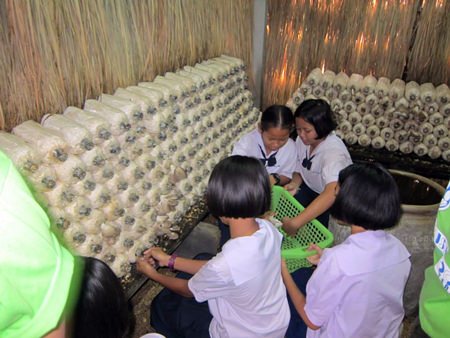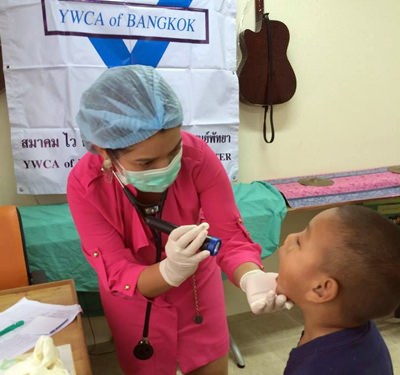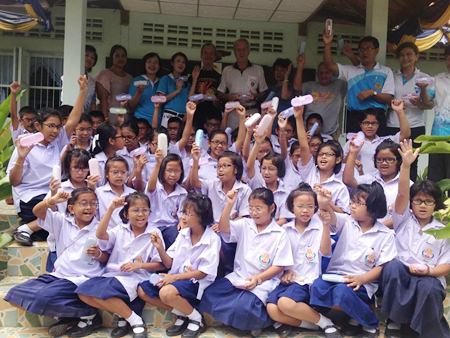Praichit Jetpai is nothing if not busy.
In addition to running her own business, serving as an advisor to the Pattaya Tourist Police and sitting on the board of the Redemptorist School for the Blind, the 44-year-old nursing and business graduate oversees nearly a dozen projects as chairwoman of the YWCA Bangkok-Pattaya Center.
“We actually have more than 10 social projects, but are working mainly on four or five,” Praichit told the Pattaya Mail in an interview.
From growing mushrooms to supplying eyeglasses and scholarships, “the YWCA is an association to help society,” she explained. “Our society will be so much more livable if all of us spare just a bit of kindness and help to encourage one another.”
 Praichit Jetpai is nothing if not busy. In addition to running her own business, serving as an advisor to the Pattaya Tourist Police and sitting on the board of the Redemptorist School for the Blind, she oversees nearly a dozen projects as chairwoman of the YWCA Bangkok-Pattaya Center.
Praichit Jetpai is nothing if not busy. In addition to running her own business, serving as an advisor to the Pattaya Tourist Police and sitting on the board of the Redemptorist School for the Blind, she oversees nearly a dozen projects as chairwoman of the YWCA Bangkok-Pattaya Center.
In that spirit, Praichit works with the Pattaya Sports Club to supply eyeglasses to children, poor people and the elderly. Working with other foundations, she and the YWCA also lead medical teams every three months to check the health of orphans, street kids and those in day-care centers.
But it’s the YWCA’s school-agriculture program she seems proudest of. The project supplies mushroom farms, complete with planters, crops and tools, to schools across the eastern region, giving the facilities another way to spend money on learning, not food, by growing their own vegetables.
 The Mushroom Farming Project helps students to earn income and utilize their time fruitfully.
The Mushroom Farming Project helps students to earn income and utilize their time fruitfully.
“The mushroom project is an opportunity to raise funds and the teachers will keep the project alive while teaching children to live sufficiently, and learn to do accounts to be informed of their expenses and income,” she said.
“After two years of operating this project, we have received amazing responses from various schools where the project was implemented. All schools are interested and want to learn more about mushrooms and to expand the project,” Praichit said.
 The YWCA leads medical teams every three months to check the health of orphans, street kids and those in day-care centers.
The YWCA leads medical teams every three months to check the health of orphans, street kids and those in day-care centers.
The chairwoman takes pains to note no one at the YWCA is a “mushroom expert.” Instead, the group brings in city workers and academics from Chandrakasem Rajabhat University to provide schools with advice on mushroom growing, including organizing monthly seminars.
While many of the YWCA’s project serve both sexes, the association’s mission of “developing the leadership of and empowering women, young and underprivileged girls to affirm their human rights, justice, freedom, peace, human dignity, and good health” plays out at the group’s women’s shelter on Soi Town in Town.
At the three-story building, women in need of refuge get care, security and even vocational education to get them back on their feet independently, she said.
While these projects are ongoing, Praichit said the YWCA is working on more for the rest of the year, including organizing an environmental activity for youths. Kids from outlying communities will plant trees at Khao Sichan.
The association also will present scholarships to 55 schools, totaling between 350 and 400 stipends. Funds are given to teachers, not the kids directly, she noted.
 The YWCA’s “Sight First Project” provides glasses to poor students and elderly who are in need.
The YWCA’s “Sight First Project” provides glasses to poor students and elderly who are in need.
“Children make withdrawals when they need supplies by writing a withdrawal slip to the teacher. The association is quite focused on making sure that the funds really do bring benefits and are of value to the children,” she said. “Our association keeps track of all children under the supervision of teachers. We also closely watch the children’s education and spending.”
All of the association’s work, she said, tries to level the playing field for the disadvantaged.
“I believe that all lives are equal,” she said, “but all opportunities are not.”




